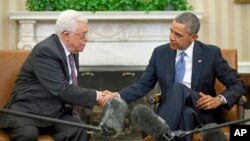U.S. Secretary of State John Kerry plans to continue pushing forward peace negotiations between Israel and the Palestinians in the coming days, after he and President Barack Obama met with Palestinian President Mahmoud Abbas.
A senior State Department official said late Monday that Kerry and Abbas held a second meeting to "exchange ideas" and discuss possible paths for the peace talks.
In the earlier meeting at the White House, Obama urged Abbas to make tough decisions and take risks for peace with Israel.
"Its very hard, its very challenging. We're going to have to take some tough political decisions and risks if we're able to move it forward," said Obama.
Abbas said he wants to see Israel carry out the scheduled release of a final group of Palestinian prisoners.
"Mr. President, we have an agreement with Israel that was brokered by Mr. Kerry concerning the release of the fourth batch of prisoners and we are hopeful that the fourth batch will be released by the 29th of March because this will give a very solid impression about the seriousness of these efforts to achieve peace," said Abbas.
Obama also pressed Israeli Prime Minister Benjamin Netanyahu to go ahead with the scheduled release of a final group of Palestinian prisoners by the end of March.
He said all parties would have to compromise in order to achieve peace.
"Its very hard, its very challenging," Obama said. "We're gonna have to take some tough political decisions and risks if we're able to move it forward."
The meeting came ahead of an April 29 target date for a framework agreement from the troubled Israeli-Palestinian peace talks.
In the West Bank's main cities Monday, thousands of Palestinians took to the streets to support Abbas' visit. Demonstrators waved flags and chanted 'We are with you, president!"
Some 1,500 people turned out in the West Bank administrative center of Ramallah, and more than 1,000 in the southern city of Hebron.
Obama met with Israeli Prime Minister Benjamin Netanyahu two weeks ago, but after more than seven months of U.S.-brokered peace talks, there is growing pessimism and acrimony.
There has been little visible progress on narrowing gaps on major issues in the more than six-decade dispute. These include the status of Jerusalem, the fate of Palestinian refugees, borders and security.
The U.S. hopes a framework deal will prevent the collapse of the peace process and enable negotiations on a final agreement to continue until the end of the year.
A senior State Department official said late Monday that Kerry and Abbas held a second meeting to "exchange ideas" and discuss possible paths for the peace talks.
In the earlier meeting at the White House, Obama urged Abbas to make tough decisions and take risks for peace with Israel.
"Its very hard, its very challenging. We're going to have to take some tough political decisions and risks if we're able to move it forward," said Obama.
Abbas said he wants to see Israel carry out the scheduled release of a final group of Palestinian prisoners.
"Mr. President, we have an agreement with Israel that was brokered by Mr. Kerry concerning the release of the fourth batch of prisoners and we are hopeful that the fourth batch will be released by the 29th of March because this will give a very solid impression about the seriousness of these efforts to achieve peace," said Abbas.
Obama also pressed Israeli Prime Minister Benjamin Netanyahu to go ahead with the scheduled release of a final group of Palestinian prisoners by the end of March.
He said all parties would have to compromise in order to achieve peace.
"Its very hard, its very challenging," Obama said. "We're gonna have to take some tough political decisions and risks if we're able to move it forward."
The meeting came ahead of an April 29 target date for a framework agreement from the troubled Israeli-Palestinian peace talks.
In the West Bank's main cities Monday, thousands of Palestinians took to the streets to support Abbas' visit. Demonstrators waved flags and chanted 'We are with you, president!"
Some 1,500 people turned out in the West Bank administrative center of Ramallah, and more than 1,000 in the southern city of Hebron.
Obama met with Israeli Prime Minister Benjamin Netanyahu two weeks ago, but after more than seven months of U.S.-brokered peace talks, there is growing pessimism and acrimony.
There has been little visible progress on narrowing gaps on major issues in the more than six-decade dispute. These include the status of Jerusalem, the fate of Palestinian refugees, borders and security.
The U.S. hopes a framework deal will prevent the collapse of the peace process and enable negotiations on a final agreement to continue until the end of the year.





